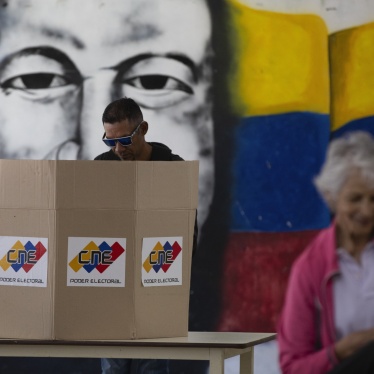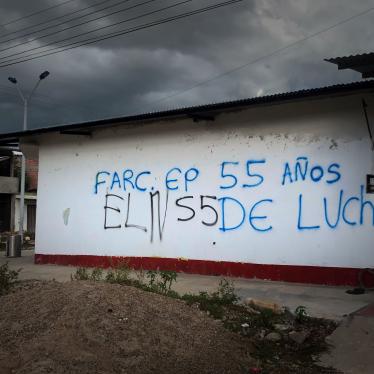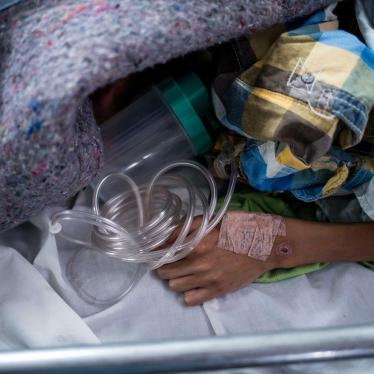Bogota, August 27, 2024
Luiz Inácio Lula da Silva
President
Federative Republic of Brazil
Brasilia—BRAZIL
Gustavo Petro
President
Republic of Colombia
Bogota—COLOMBIA
Andrés Manuel López Obrador
President
United Mexican States
Mexico City—MEXICO
Your excellencies:
I am writing, on behalf of Human Rights Watch, regarding the ongoing crisis in Venezuela.
As your excellencies known, on July 29, Venezuela’s National Electoral Council (Consejo Nacional Electoral, CNE) declared that Nicolás Maduro won the presidential election that took place the day before. To date, the CNE has not released the tally sheets from the election, nor conducted the electoral audits or citizen verification processes required by law.[1] The UN Electoral Technical Team and the Carter Center, which observed the elections, said the process lacked transparency and integrity and questioned the declared result.[2] Instead, they have granted credibility to the precinct-level tally sheets that the opposition has made public which indicate that Edmundo González won the election by a significant margin.[3]
Human Rights Watch has been documenting the government repression that followed the announcement of these electoral results. We have received credible reports that 23 protesters and bystanders, as well as one member of the Bolivarian National Guard, have been killed in the context of protests. Security forces have detained over 2,000 people, according to the government. The pro bono group of lawyers Foro Penal has verified over 1,500 cases, including roughly 130 children and 20 people with disabilities. Only 90 people have been reported to be released, while hundreds of others have been charged with “terrorism.”[4] In many ways, the current wave of arbitrary arrests in Venezuela appears to be unprecedented in the country’s recent history, surpassing on average the rates of arrests during the prolonged anti-government protests of 2014 and 2017.[5]
In this alarming context, we welcome efforts by governments in Latin America, Europe and the United States to ensure respect for the will of the people as expressed in the ballots on July 28, as well as to put an end to widespread human rights violations. We have followed, with great interest, the initiatives led by your governments to negotiate a solution to this crisis.
We continue to believe that a meaningful negotiation among all relevant stakeholders is the best way to protect human rights in Venezuela.[6] As your governments have noted, transparent and impartial verification of electoral results, dialogue and agreement-seeking efforts, and guarantees for all Venezuelans to participate in politics are likely to be key components of such a negotiated solution.[7] Other key components are likely to include targeted sanctions for members of the military responsible for human rights violations and related corruption, as well as incentives for Maduro’s international allies and the private sector operating in Venezuela so that these actors also promote respect for the electoral results and human rights.
We are, however, concerned about three specific proposals that your governments have made in recent weeks: (1) repeating the election; (2) relying on Venezuela’s Supreme Court to resolve the election outcome; and (3) granting a “general amnesty.”
Below we describe our concerns regarding these specific proposals, on the basis of international human rights law and our decades-long experience in Venezuela.
- A repeat election?
The government of Brazil has suggested that a possible solution to the crisis in Venezuela would entail repeating the election.[8] Similarly, President Petro has suggested that there should be “new free elections.”[9]
As your excellencies understand well, a basic premise of any election is that it should reflect the expressed will of the people and result in the peaceful transfer of power to the prevailing candidate or candidates in accordance with prearranged formulas.
Repeating the election because the Maduro government is not willing to disclose and accept the result of the July 28 elections would make a mockery of these principles. Such a proposal would be unacceptable in any country. It would be particularly problematic in Venezuela given the significant barriers voters and candidates were forced to overcome in order to participate in the July 28 elections, including widespread human rights violations, that made the playing field markedly uneven and put many voters and candidates at risk of government abuse.[10]
Additionally, since the election, the Maduro government has taken steps to make the playing field even more uneven, by arresting members of the opposition, threatening to imprison González and the opposition leader María Corina Machado, passing a law that grants the government broad power to shut down NGOs, and proposing laws to further restrict international electoral observation.[11]
While we reject the idea of repeating the election, we agree with your governments that a solution to the crisis in Venezuela should include guarantees for all political parties to take part in public affairs. Like elsewhere, that would require ensuring the participation of people with diverse political views, including those allied to Maduro, in different institutions within the Venezuelan state, including in the National Assembly and in governor’s offices. It would also require the end of arbitrary prosecution of opposition leaders and other critics, and the release of all people who remain arbitrarily detained. We urge your excellencies to continue focusing your efforts on these initiatives and in ensuring respect for the will of the people as reflected in the July 28 election.
- Relying on Venezuela’s Supreme Court to Resolve the Election Outcome?
Your governments have stated that “disputes about the electoral process must be settled through institutional channels.”[12] The government of Mexico has said that it is “awaiting the decision of the Supreme Court’s Electoral Chamber” with regards to the election.[13] President López Obrador interrupted his participation in your governments’ dialogues on Venezuela pending a Supreme Court decision on the tally sheets and results.[14]
As your excellencies are aware, on August 22 the Supreme Court “categorically validated” the electoral results announced by the CNE and called on electoral authorities to “publish the final results.”[15] The court also said that the tally sheets made public by the opposition were “allegedly fake or forged” and urged authorities to investigate the “fear” that these had caused in the population.[16]
In a welcomed statement after the ruling, President López Obrador said that his government would “wait until the tally sheets are made public” before recognizing a winner in the election. He said that while the “Supreme Court says that President Maduro won the election, it also recommends publishing the results.”[17] Likewise, Presidents Petro and Lula da Silva, “took note of the decision” and said that “they are still awaiting the release, by the National Electoral Council, of the tally sheets broken down by polling station.”[18]
Several Venezuelan legal experts had questioned whether the Supreme Court’s Electoral Chamber had the legal mandate to resolve this case.[19] More importantly, a wide range of international authorities, including the Inter-American Commission on Human Rights and the UN High Commissioner on Human Rights, agree the court lacks independence from the government.[20]
The prosecutor of the International Criminal Court (ICC), Karim Khan, on the basis of his office’s preliminary examination, has identified several factors “affecting the independence and impartiality” of Supreme Court judges in Venezuela, including that most of them are “reported to have connections with the current political party in power,” that some were appointed in violation of Venezuelan law and that there are credible allegations that judges are appointed “because of their perceived loyalty to the government.”[21]
Similarly, the United Nations’ Independent International Fact-Finding Mission on Venezuela has documented credible allegations that the Supreme Court justices “routinely receive orders with respect to how to decide judgments” from the executive branch.[22]
Instead of protecting Venezuelans’ right to participate in free and fair elections, the Court has played a leading role in undermining the 2024 electoral process. In January 2024, the Court upheld a decision to bar Machado, as well as Henrique Capriles, from running for office.[23] The Court has also repeatedly appointed government supporters to leadership positions in opposition parties, including Acción Democrática, Primero Justicia and, more recently, the Venezuelan Communist Party, undermining the parties’ autonomy.[24]
Additionally, following the announced electoral results, the Supreme Court congratulated Nicolás Maduro for his “re-election,” saying that the electoral process was “peaceful, transparent, effective, auditable and an example for the world.”[25]
Given this context, the Supreme Court’s final decision is not a credible analysis of the electoral results or Venezuelan law that will inspire widespread trust or acceptance. We therefore urge your governments to insist on an independent verification of the results, which should be conducted by a credible and impartial third party.
- A “general amnesty”?
President Gustavo Petro has suggested that there should be a “general amnesty” of “national and international” reach in Venezuela.[26]
As your excellencies are aware, under international law, governments have an obligation to investigate and prosecute serious human rights violations and international crimes.[27] The United Nations Fact Finding Mission on Venezuela—as well as human rights organizations in Venezuela and abroad—have repeatedly documented serious human rights violations in the country. The Mission has identified reasons to believe that members of the Maduro government have committed crimes against humanity, including extrajudicial executions, politically motivated detentions and torture.[28] Separately, the Office of the Prosecutor of the ICC has been conducting, since 2021, an investigation into crimes against humanity in the country.
Respecting these obligations under international human rights law will likely require strategic criminal investigations that prioritize those most responsible for atrocities and focus on the worst and most notorious crimes.
Alongside the obligation to investigate and prosecute serious abuses, other transitional justice mechanisms may be necessary to remedy harms, restore the rule-of-law and ensure non-recurrence following conflict or crisis. Such efforts may entail legal reforms, and vigorous mechanisms to ensure truth telling and restorative and reparative justice.
As the recent experience in Colombia shows, non-blanket conditional amnesties may also have a role to play.[29] However, President Petro’s broadly phrased proposal appears to violate international law, in ways that would affect the rights of victims of atrocities. Equally, such proposal would fail to ensure legal certainty for all stakeholders in Venezuela, as amnesties in violation of international law could easily be abrogated or disregarded by national, foreign or international jurisdictions in the future.
We hope you take these recommendations into consideration as you pursue your valuable efforts to find a solution to the crisis in Venezuela. I remain at your disposal to discuss this matter further or share additional information regarding the situation in Venezuela.
Juanita Goebertus Estrada
Director
Americas Division
Human Rights Watch
[1] See Bylaws to the Organic Law on Electoral Process, signed into law January 18, 2013, article 437; Organic Law on Electoral Processes, Organic Law on Electoral Processes, signed into law August 12, 2009, articles 156-163. See also “Venezuela Presidential Election: International Organizations Call on Authorities to Guarantee Transparency,” press release by international human rights organizations, July 30, 2024, https://www.hrw.org/news/2024/07/30/venezuela-presidential-election-international-organizations-call-authorities.
[2] UN Panel of Experts – Venezuelan Presidential Elections 28 July 2024, “Interim Report”, August 9, 2024, https://news.un.org/en/sites/news.un.org.en/files/atoms/files/Interim_Report_PoE_Venezuela_090824.pdf, paras. 11-12; “Carter Center Statement on Venezuela Election,” Carter Center press release, July 30, 2024, https://www.cartercenter.org/news/pr/2024/venezuela-073024.html (accessed August 23, 2024).
[3] See “Resultados con Venezuela”, August 5, 2024, https://resultadosconvzla.com/ (accessed August 23, 2024).
[4] Post on X by @ForoPenalENG, August 18, 2024, https://x.com/ForoPenalENG/status/1825230772866867557 (accessed August 23, 2024).
[5] For example, according to CEPAZ, there were approximately 3,300 arrests during five months of protests in 2014, while the number of arrests surged to over 5,000 in four months in 2017. See “El efecto ejemplarizante de la represión es ahora más evidente que nunca,” CEPAZ press release, https://cepaz.org/el-efecto-ejemplarizante-de-la-represion-es-ahora-mas-evidente-que-nunca/ (accessed August 23, 2024). For Human Rights Watch reporting on the 2014 and 2017 protests see, Human Rights Watch, Punished for Protesting: Rights Violations in Venezuela’s Streets, Detention Centers, and Justice System (Human Rights Watch: New York, 2014), https://www.hrw.org/report/2014/05/05/punished-protesting/rights-violations-venezuelas-streets-detention-centers-and; Human Rights Watch, Crackdown on Dissent: Brutality, Torture, and Political Persecution in Venezuela (Human Rights Watch: New York, 2017), https://www.hrw.org/report/2017/11/29/crackdown-dissent/brutality-torture-and-political-persecution-venezuela.
[6] See Letter from Human Rights Watch to President Gustavo Petro, October 24, 2022, https://www.hrw.org/news/2022/10/24/letter-colombian-president-gustavo-petro-restablishment-diplomatic-relations.
[7] “Presidential elections in the Bolivarian Republic of Venezuela – joint press release by Colombia, Brazil and Mexico,” Foreign Ministries of Colombia, Brazil and Mexico press release, August 1, 2024, https://www.cancilleria.gov.co/newsroom/publiques/elecciones-presidenciales-republica-bolivariana-venezuela-comunicado-conjunto (accessed August 23, 2024); Post on X by @CancilleriaCol, August 8, 2024, https://x.com/CancilleriaCol/status/1821652789455425951 (accessed August 23, 2024).
[8] See, e.g., Tom Phillips, “Lula says he doesn’t yet recognize Maduro as winner of Venezuela election,” The Guardian, August 15, 2024, https://www.theguardian.com/world/article/2024/aug/15/lula-maduro-venezuela-election (accessed August 23, 2024).
[9] Post on X by @petrogustavo, August 15, 2024, https://x.com/petrogustavo/status/1824118561050169566 (accessed August 23, 2024).
[10] “Venezuela: Repression Mars Key Upcoming Election,” Human Rights Watch news release, July 25, 2024, https://www.hrw.org/news/2024/07/25/venezuela-repression-mars-key-upcoming-election.
[11] “Tarek William Saab: María Corina Machado Could Be Charged in Any Moment,” El Nacional, August 19, 2024, https://www.elnacional.com/venezuela/tarek-william-saab-en-cualquier-momento-maria-corina-machado-pudiera-ser-imputada/ (accessed August 23, 2024); Post on X by @Asamblea_Ven, August 15, 2024, https://x.com/Asamblea_Ven/status/1824147832024260809 (accessed August 23, 2024); “Jorge Rodríguez proposes reforms to electoral norms to prohibit international observation,” El Nacional, August 14, 2024, https://www.elnacional.com/venezuela/jorge-rodriguez-propone-reformar-leyes-electorales-para-prohibir-la-observacion-internacional/ (accessed August 23, 2024).
[12] “Presidential elections in the Bolivarian Republic of Venezuela – joint press release by Colombia, Brazil and Mexico,” Foreign Ministries of Colombia, Brazil and Mexico press release, August 1, 2024.
[13] OAS Permanent Council, Note of the foreign ministry of Mexico, August 16, 2024, https://scm.oas.org/doc_public/spanish/hist_24/CP50242S03.docx (accessed August 23, 2024).
[14] Morning press conference, President Andrés Manuel López Obrador, Mexico City, August 13, 2024, https://www.gob.mx/presidencia/articulos/version-estenografica-conferencia-de-prensa-del-presidente-andres-manuel-lopez-obrador-del-13-de-agosto-de-2024 (accessed August 20, 2024).
[15] Post on Instagram by @tsj_venezuela, August 22, 2024, https://www.instagram.com/p/C-_CFYHS0ee/ (accessed August 25, 2024).
[16] Ibid.
[17] Morning press conference, President Andrés Manuel López Obrador, Mexico City, August 23, 2024, https://www.gob.mx/presidencia/es/articulos/version-estenografica-conferencia-de-prensa-del-presidente-andres-manuel-lopez-obrador-del-23-de-agosto-de-2024 (accessed August 25, 2024).
[18] “Joint declaration from Brazil and Colombia,” Presidents of Brazil and Colombia press release, August 24, 2024, https://cancilleria.gov.co/newsroom/publiques/declaracion-conjunta-brasil-colombia (accessed August 25, 2024).
[19] “Six comments regarding the lawsuit before the Supreme Court about the July 28 elections,” Acceso a la Justicia press release, August 8, 2024, https://accesoalajusticia.org/seis-observaciones-recurso-contencioso-electoral-ante-tsj-sobre-elecciones-28j/ (accessed August 23, 2024).
[20] Inter-American Commission on Human Rights, Annual Report 2023, “Chapter IV.B: Venezuela,” December 31, 2023, https://www.oas.org/en/iachr/docs/annual/2023/chapters/IA2023_Cap_4B_Venezuela_ENG.PDF (accessed August 23, 2024), para. 4; Human Rights Council, United Nations High Commissioner for Human Rights, "Independence of the judicial system and access to justice in the Bolivarian Republic of Venezuela, also with regard to violations of economic and social rights, and the human rights situation in the region of the Orinoco Mining Arc", 29 September 2020, UN Doc. A/HRC/44/54, https://undocs.org/Home/Mobile?FinalSymbol=A%2FHRC%2F44%2F54&Language=E&DeviceType=Desktop&LangRequested=False, para.66.
[21] ICC Prosecutor Karim Khan, “Prosecution request to resume the investigation into the situation in the Bolivarian Republic of Venezuela I pursuant to article 18(2),” November 1, 2022, https://www.icc-cpi.int/sites/default/files/CourtRecords/CR2022_06554.PDF (accessed August 23, 2024), paras. 147-151.
[22] Human Rights Council, United Nations’ Independent International Fact-Finding Mission on Venezuela, “Detailed findings of the independent international factfinding mission on the Bolivarian Republic of Venezuela,” September 16, 2021, https://www.ohchr.org/sites/default/files/Documents/HRBodies/HRCouncil/FFMV/A-HRC-48-CRP.5_EN.pdf (accessed August 23, 2024), paras. 132-137.
[23] See, e.g., Letter from Human Rights Watch to Presidente Gustavo Petro, February 1, 2024, https://www.hrw.org/es/news/2024/02/02/carta-al-presidente-gustavo-petro-sobre-inhabilitacion-de-maria-corina-machado-en.
[24] “Venezuela: Rulings Threaten Free and Fair Elections,” Human Rights Watch press release, July 1, 2020, https://www.hrw.org/news/2020/07/07/venezuela-rulings-threaten-free-and-fair-elections; Post on X by @PCV_Venezuela, August 12, 2023, https://x.com/PCV_Venezuela/status/1690215658925989889 (accessed August 23, 2024).
[25] Post on X by @TSJ_Venezuela, July 29, 2024, https://x.com/tsj_venezuela/status/1818072469309124713 (accessed August 23, 2024).
[26] Post on X by @petrogustavo, August 15, 2024, https://x.com/petrogustavo/status/1824118561050169566 (accessed August 23, 2024).
[27] See e.g., Inter-American Court of Human Rights, Barrios Altos Case, Judgment of March 14, 2001, Inter-Am.Ct.H.R., (Ser. C) No. 75 (2001), paras. 41-44; Inter-American Court of Human Rights, Almonacid Arellano Case, Judgment of September 26, 2006, Inter-Am.Ct.H.R., (Ser. C) No. 154 (2006), paras. 119, 145, 152; UN Human Rights Committee, “General Observation 31. The Nature of the General Legal Obligation Imposed on States Parties to the Covenant,” UN Doc. CCPR/C/21/Rev.1/Add.13, May 26, 2004, paras. 15; UN General Assembly, “Basic Principles and Guidelines on the Right to a Remedy and Reparation for Victims of Gross Violations of International Human Rights Law and Serious Violations of International Humanitarian Law,” UN Doc. A/RES/60/147, December 16, 2005, https://www.ohchr.org/en/professionalinterest/pages/remedyandreparation.aspx (accessed August 23, 2024).
[28] Human Rights Council, United Nations’ Independent International Fact-Finding Mission on Venezuela, “Detailed findings of the independent international factfinding mission on the Bolivarian Republic of Venezuela,” September 15, 2020, https://www.ohchr.org/sites/default/files/Documents/HRBodies/HRCouncil/FFMV/A_HRC_45_CRP.11.pdf (accessed August 23, 2024), para. 2084.
[29] See, e.g., Colombian Constitutional Court, ruling C-007-18, decision of March 1, 2018, https://www.corteconstitucional.gov.co/relatoria/2018/C-007-18.htm (accessed August 23, 2024). See also Office of the United Nations High Commissioner for Human Rights, Rule-of-law Tools for Post-Conflict States: Amnesties, 2009, https://www.ohchr.org/sites/default/files/Documents/Publications/Amnesties_en.pdf (accessed August 23, 2024).







